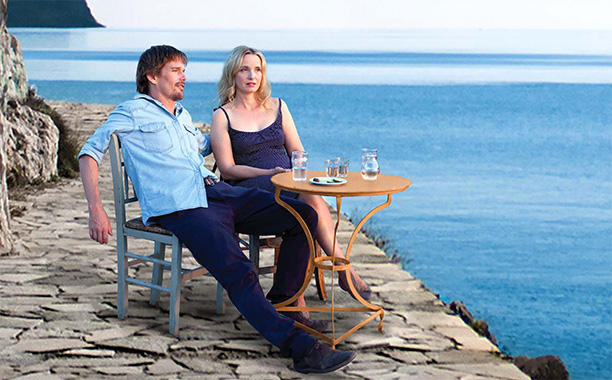Eugenio Mira is a director who understands the difference between a ticking suitcase and a bomb exploding. And he uses that difference to his advantage throughout the movie Grand Piano. Here we find a slice of Old Hollywood – a Hitchcockian thriller, featuring a lead character named Selznick, with a wink and a nod to Citizen Kane. Add a new Chicago looking old along with an opening theme right out of The Untouchables, and, conceptually, Grand Piano has a lot of good things working in its favor.
But a critical gap exists between pitch and execution, and the longer Grand Piano lingers on (which is only 90 minutes, by the way), the more implausible its lead character choices become. Tom Selznick (Elijah Wood) goes from making really dumb decisions, to making really smart decisions, to making inconceivably stupid decisions. During the first half-hour, Selznick is motivated by fear, during the second half-hour, self-preservation, and during the final half-hour, whatever Mira needs to keep the storyline afloat. It’s a common pitfall wherever big-screen thrillers are concerned. The writer and director work so hard on airtight set-up, they wind up sacrificing credibility down the road. Think Silent House, or House of Games, or even the final episode of Lost.
Grand Piano succeeds in mimicking the style and tradition of Alfred Hitchcock. Mira employs an entire litany of Hitch standards including: psychedelic lighting, jagged camera angles, split-screens and The Vertigo Effect. But Mira fails to adjust integral plot points in accordance with the times. Back in 1959, moviegoers might’ve been willing to accept the real-world ineptitude of a North by Northwest. But expectations have evolved, and so too have storytellers’ ability to oblige. This isn’t the case toward the end of Grand Piano, a movie which may be entitled to a pass specifically because it’s an homage to early thrillers.
Finally, a word about the casting, as this represents a glaring oversight, to say the least. Elijah Wood is almost invisible as the leading man, a well-coiffed body in a board-stiff suit that’s performance – above and beyond playing the piano – feels equally starched. John Cusack, meanwhile, in his current pursuit of playing villainous men, seems completely out of place. The same can be said for a lot of the lead players, a dynamic which causes one to wonder how much better Grand Piano might’ve been with ample casting.
All told, Grand Piano is still an entertaining throwback, so long as one accepts it on those terms. A great deal of work went into synchronicity (Eugenio Mira’s also a talented composer), and, as such, Mira has tapped into a wellspring worth exploring. A little tightening on the story and some slightly better casting, and this director might be looking at a breakthrough down the road.
(Grand Piano is currently available via iTunes and OnDemand. It arrives in theaters on March 7th.)

